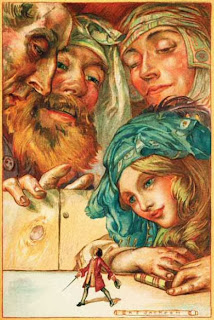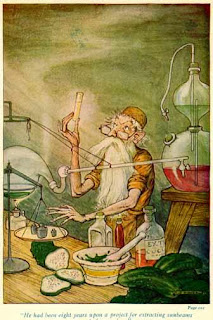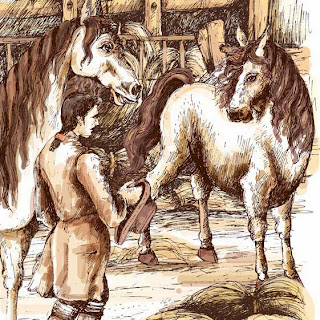“Gulliver’s Travels” is a great work of social satire. Swift’s age was an age of smug complacency. Corruption was rampant and the people were still satisfied. Thus, Jonathan Swift tears the veil of smug complacency off which had blinded the people to realities. In “Gulliver’s Travels”, there is a satire on politics, human physiognomy, intellect, manners and morality.
In the first voyage to Lilliput, Swift satirizes on politics and political tactics practiced in England through Lilliputians, the dwarfs of six inches height. He satirizes the manner in which political offices were awarded by English King in his time. Flimnap, the Treasurer, represents Sir Robert Walpole who was the Prime Minister of England. Dancing on tight ropes symbolizes Walpole's skill in parliamentary tactics and political intrigues. The ancient temple, in which Gulliver is housed in Lilliput, refers to Westminster Hall in which Charles I was condemned to death. The three fine silk threads awarded as prizes to the winners refer to the various distinctions conferred by English King to his favourites. The Lilliputians were highly superstitious:
They bury their dead with their head directly downwards because they hold an opinion that after eleven thousand moons they are all to rise again.Gulliver’s account of the annoyance of the Empress of Lilliput on extinguishing fire in her apartment is Swift’s satirical way of describing Queen Anne’s annoyance with him on writing “A Tale of a Tub”. Swift’s satire becomes amusing when Gulliver speaks of the conflict between the Big Endians and the Little Endians. In this account Swift is ridiculing the conflicts between the Roman Catholics and the Protestants. High Heel and Low Heel represent Whig and Tory – two political parties in England.
 In the second voyage to Brobdingnag, there is a general satire on human body, human talents and human limitations. Gulliver gives us his reaction to the coarseness and ugliness of human body. When Gulliver gives an account, to the King of Brobdingnag, of the life in his own country, the trade, the wars, the conflicts in religion, the political parties, the king remarks that the history of Gulliver's country seems to be a series of conspiracies, rebellions, murders, revolutions and banishments etc. Kind condemns the fatal use of gunpowder and the books written on the act of governing. King mocks at the human race of which Gulliver is the agent.
In the second voyage to Brobdingnag, there is a general satire on human body, human talents and human limitations. Gulliver gives us his reaction to the coarseness and ugliness of human body. When Gulliver gives an account, to the King of Brobdingnag, of the life in his own country, the trade, the wars, the conflicts in religion, the political parties, the king remarks that the history of Gulliver's country seems to be a series of conspiracies, rebellions, murders, revolutions and banishments etc. Kind condemns the fatal use of gunpowder and the books written on the act of governing. King mocks at the human race of which Gulliver is the agent.The most pernicious race of little odious vermin that nature ever suffered to crawl upon the surface of the earth.Swift here ridicules human pride and pretension. The sight is, indeed, horrible and disgusting. Among the beggars is a woman with a cancer in her breast.
It stood prominent six feet, and could not be less than sixteen in circumference … spots and pimples that nothing could appear more nauseous.There is a man with a huge tumor in his neck; another beggar has wooden legs. But the most hateful sight is that of the lice crawling on their clothes. This description reinforces Swift views of the ugliness and foulness of the human body.
 In the third voyage to Laputa, there is a satire on human intellect, human mind and on science, philosophy and mathematics. However, his satire is not very bitter. We are greatly amused by the useless experiments and researches, which are going on at the academy of Projectors in Lagado. Here scientists wants to extract sunbeams out of cucumbers, to convert human excrement into its original food, to build house from the roof downward to the foundation, to obtain silk from cobwebs and to produce books on various subjects by the use of machine without having to exert one’s brain.
In the third voyage to Laputa, there is a satire on human intellect, human mind and on science, philosophy and mathematics. However, his satire is not very bitter. We are greatly amused by the useless experiments and researches, which are going on at the academy of Projectors in Lagado. Here scientists wants to extract sunbeams out of cucumbers, to convert human excrement into its original food, to build house from the roof downward to the foundation, to obtain silk from cobwebs and to produce books on various subjects by the use of machine without having to exert one’s brain.Their heads were inclined either to the right or to the left, one of their eyes turned inward, and the other directly up to Zenith.Swift amuses us by making a fun of the people whose sole interests are music and geometry.
They made a lot of theories but practically nill.Swift here ridicules scientists, academics, planers, intellectual, in fact, all people who proceed, only according to theory which are useless when they come to actual practice. He satirizes historian and literary critics though Gulliver’s interviews with the ghosts of famous dead. The point of satire is that historian often distorts facts and literary critics often misinterpret great authors like Homer and Aristotle.
In the fourth voyage to Houyhnhnms, there is a bitter poignant satire on human moral shortcomings. Voyage contains some of the most corrosive and offensive satire on mankind. The description of the Yahoos given to us by Gulliver is regrettable.
Yet I confess I never say any sensitive being so detestable on all accounts; and the more I came near them, the more hateful they grew.
 By contrast, the Houyhnhnms are noble and benevolent horses who are governed by reason and lead an ordered life. It is, indeed, a bitter criticism on the human race to be compared by the Houyhnhnms. The satire deepens when Gulliver gives an account, to the master Houyhnhnms, of the events in his country. He tells him that war in European countries was sometimes due to the ambition of kings and sometimes due to the corruption of the ministers. He speaks of the numerous deadly weapons, employed by European nations for destructive purposes. Many people in his country ruin themselves by drinking, gambling and debauchery and many are guilty of murders, theft, robbery, forgery and rape. The master speaks of the Yahoo’s love of shinning stones, their gluttony and their weakness for liquor. The master also speaks of the lascivious behaviour of the female Yahoos. By contrast, the Houyhnhnms are excellent beings.
By contrast, the Houyhnhnms are noble and benevolent horses who are governed by reason and lead an ordered life. It is, indeed, a bitter criticism on the human race to be compared by the Houyhnhnms. The satire deepens when Gulliver gives an account, to the master Houyhnhnms, of the events in his country. He tells him that war in European countries was sometimes due to the ambition of kings and sometimes due to the corruption of the ministers. He speaks of the numerous deadly weapons, employed by European nations for destructive purposes. Many people in his country ruin themselves by drinking, gambling and debauchery and many are guilty of murders, theft, robbery, forgery and rape. The master speaks of the Yahoo’s love of shinning stones, their gluttony and their weakness for liquor. The master also speaks of the lascivious behaviour of the female Yahoos. By contrast, the Houyhnhnms are excellent beings.Here was neither physician to destroy my body not lawyer to ruin my fortune; no informer to watch my words and actions … here were no … backbiters, pickpockets, highwaymen, house-breakers … politicians, wits … murderers, robbers … no cheating shop-keeper or mechanics, no pride, vanity or affectation.They hold meetings at which the difficulties of their population are discussed and solved. They regulate their population and do not indulge in sexual intercourse merely for pleasure.
Everything is calculated as the Plato’s Utopian land ‘The Republican’.Swift’s purpose here is to attribute to horses certain qualities which would normally be expected in human beings but which are actually lacking in them. Gulliver’s reaction o Houyhnhnms fills him so much admiration for them and with so much hatred and disgust for human beings that he has no desire even to return to his family.
Thus we see that “Gulliver’s Travels” is a great piece of art containing social satire in it. Every satirist is at heart a reformist. Swift, also, wants to reform the society by pinpointing the vices and shortcoming in it. And he very successfully satirizes on political tactics, physical awkwardness, intellectual fallacies and moral shortcomings.

Post a Comment
you need to cite your quotes with page numbers
very helpful
well done....thanks alot
well done
thanks a lot it helped for my works
Thanks a Million!
good
thank u sir.
Khup khup danyavat
Very helpful